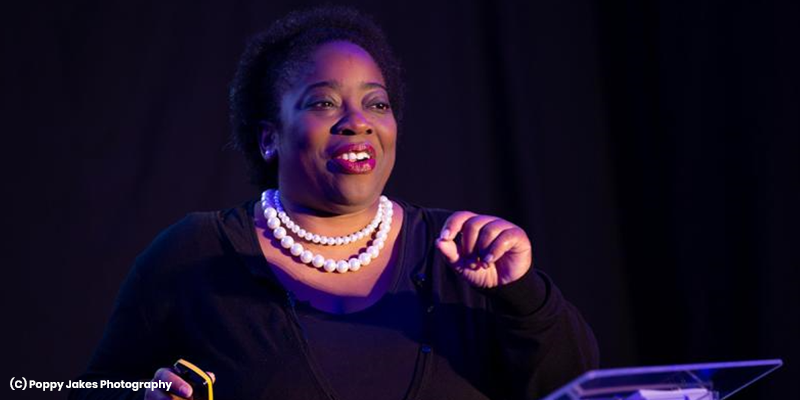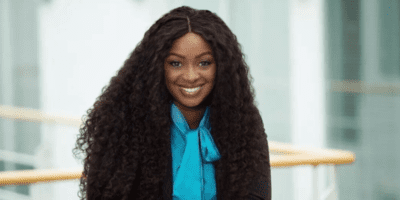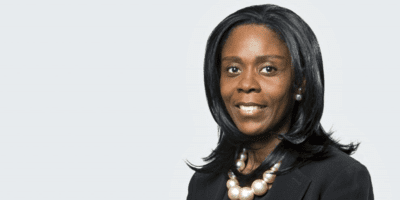Suki Fuller is a storyteller, advisor, futurist and mentor who founded her own company, Miribure, in 2015. She also co-founded DC Analytics, an open-source intelligence consulting company, in 2008. Suki sits on the advisory boards for Tech London Advocates and Global Tech Advocates (as well as being on the committee for their Black Women in Tech group and co-leading the Women in Tech group) and she is a Fellow of The Council of Competitive Intelligence Fellows.
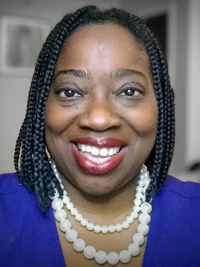
“When I was a kid, I always wanted to be like James Bond, with a little bit of Indiana Jones thrown in. It didn’t really matter that they were male. I never really thought that they were male role models. I just thought they were role models.”
Educational background and career to date
I started my schooling in the UK — I am British born, I went to primary school, one year in secondary school, also international schools such as DoDDS (Department of Defense Dependents Schools). When my mother remarried, I moved to the US permanently and attended an American school.
My educational background is very mixed. I think I got the best of both worlds, because, somewhat ironically, I developed a better understanding of US history and geography in the UK than I did under the curriculum in the US.
After I graduated from high school, I went to Penn State, (Pennsylvania State University), where I started out on an engineering and pre-law programme. The engineering was chemical engineering mainly because my biological father was a computer, electrical and mechanical engineer, and I basically wanted to one-up him! Whilst I was studying I ended up getting a job as a chemical engineer in an electroplating facility.
I worked on ferrous and some non-ferrous metals. Basically, the shiny things that you see on automobiles like hubcaps, Harley Davidson parts, chrome plating, aerospace pieces, medical equipment. I worked in a big enclosed lab by myself for eight hours a day. I was the first woman and only woman in that 100-year-old company’s history. When I decided I didn’t want to complete my degree course they said I could keep working there.
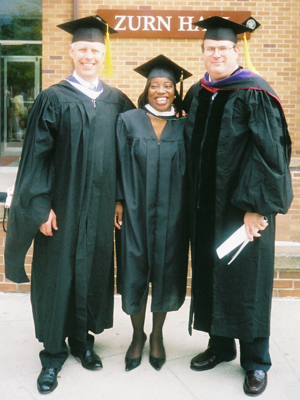
After this, I figured out what I wanted to do for a few years and started on a programme in intelligence studies, where you are taught the theory and practical application of the intelligence cycle, and how to be an intelligence analyst.
I got to work with government agencies as well as private corporations while I was at university getting that degree. I secured an internship with Navistar, a medium-sized international truck and engine company that makes the engines of those huge 18 wheelers trucks that you see.
When you got your degree, you walked out the door and you could work for any international corporation or government organisation because you knew all about the intelligence cycle. (That’s being able to gather information, organise it and analyse it, and then give some sort of recommendation to make it actionable for people.)
I worked in a lot of different sectors: technology; automotive; pharmaceuticals. You name it, I’ve done a project or worked in an organisation where I might have been asked to come in for a few months.
While I was working for a consulting company, went to China. I’d always wanted to go to China since I was a child to experience that, so I taught at university business management for a year. I also taught a couple other courses (no intelligence courses though) for some of the instructors, some of the professional professionals in the city and also some of the professors.
It was fun because it was back in 2009, just after the Olympics, so Chinese people were still very much in awe of somebody who was Black. They would come over and touch your skin, and they’d want to take pictures with you. They would hand you their babies to have your picture taken with them because they’d never seen a Black person in person before, so it was a big deal. People would even come over and ask me if I was Usain Bolt’s wife.
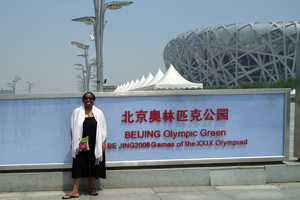
People were becoming more aware of athletes, instead of just seeing television in China for the Olympics, where they would just show the Chinese athletes competing. They didn’t really show the Olympics live stream before then, and so it was really quite fascinating.
My partner at the time was a blonde-haired, blue-eyed German, with a Black woman so were like celebrities. They would come up to me and say “Oprah!”, because that was the only Black female figure they knew.
After China, I moved back to Europe (I was living part-time in Germany as well as the UK). I decided to start my own company. In addition to this, I still work in a consortium with my old consulting company and people that I went to school with, because we do national security, non-profit, and also business intelligence. (I have experience in all three.) We have kept working together all for these years because we can always call on each other’s expertise in different areas, but I decided to set up my own company too.
When I moved to the UK, someone, I don’t remember who it was, asked me to become involved with an accelerator. I had mentored when I was in university. I didn’t find out until 2019 how many people in my own graduating class that I had actually supported, mentored or coached. I just thought I was helping out another student, but then all of these students wrote to me about how I had helped them, after I got a distinguished alumni award, and I stated: “I don’t even remember doing that!”
Other students had been saying things like: “Oh, my gosh, I would never have passed that class without your help. I wouldn’t have graduated if it wasn’t for you.” It was amazing but it’s really weird because you don’t think of it at the time. You’re not doing it for that. You’re just doing it because you’re just like: “Hey, somebody needs some help. Oh, yeah, I can help you. I know how to do that.”
Running my own consultancy
My role in my consulting company day-to-day, depends on the particular topic. So, it might be something like finding out what the client’s competitor is marketing. Day-to-day, now I work more on the strategic end of intelligence than on the data and but I could be going into a client because they’re really trying to understand the strategic vision of a competitor, so the client is trying to understand where they’re positioned in the market in relation to their competitors.
They will be asking about an area that they want to move into, but they’ve heard through the grapevine that competitors are also researching in the same area, so they want to know what we can tell them about what the competitors are doing.
Sometimes it’s just me going to interview joint clients, joint suppliers, former employees of that old company of that other company, or even sometimes people that work at that other company to find out what they’re doing, but it’s not espionage. I really have to underline that, because a lot of people think competitive intelligence or even strategic intelligence is corporate espionage, and that’s illegal. You know, dumpster diving. That’s the stuff of James Bond.
What I do is all very open source. If somebody asked me who I am, I tell them. I don’t have to tell them who the client is, but I can’t lie and say: “I’m just a student doing research.”
If I’m being pedantic, it’s information and not actually intelligence until the analysis is applied to it. It’s just like people always say: “Oh, you know, yeah, we did all this, blah, blah, blah.” But that’s data, which doesn’t become intelligence until the actual process of analysis, which is the qualitative aspects of a human perspective being applied to it. Only then it becomes intelligence, and then it becomes actionable intelligence when it’s applied.
In a lot of companies’ librarians are part of the intelligence group. So, we have knowledge management people, and they’re the ones that are actually handling all of the databases. That’s not the part that interests me most but it’s definitely a critical skill set.
There are people in the middle correlating and organising. I’m more of the person in the beginning and at the end, a collector. It’s either open source or primary source, but my specialty is primary source, where I’m going to the people, the actual physical people and speaking to them, and getting them to give me information that I can analyse and turn into intelligence.
Impact of COVID
My job is harder now that you can’t go places, because I LOVE conferences. They are a hotbed of information just spewing out of people. It’s amazing how much people give away when they’re at a conference because they want to talk and they want to sell their products. They’re just selling, selling, selling information and you’re like: “Wow, I think you just gave me the secret sauce to your recipe!”
I talked to you, and I talked to the other salesperson. Then I went to talk to the guy that supplies you and then I went to talk to your big boss and I put it all together.
That’s what people don’t understand is that intelligence comes from multiple places. When I’m researching, I’m not just getting the information from one source. If you get it from one source that’s not intelligence, that’s just someone’s perspective. That’s an opinion. That’s their life, their lived experience, but that’s all it is.
COVID has meant I’m missing the public speaking element of my work too. I love hosting and moderating, and public speaking. I think it helps when you can be your authentic self all the time. I’m an ambivert but I think the pandemic has really moved me back into being an introvert. As a child, I was a bit introverted, but my brother was more so. I used to read a dictionary just for fun. I’d read anything just so I didn’t have to talk to people.
That’s probably what’s aided me in my career because a lot of people think that I am an extrovert. When I’m around people, I feed off of the energy, but then I go home and I’m absolutely exhausted for the next 48 hours. I don’t talk to anybody and then maybe in the 72 hours, I might talk to one person. It’s always been that I thrive when I’m around people, and then I have to go home and re-energise.
Now, because of the pandemic, when I’m doing a conference or an event, I’m doing it in my home environment, so when I’m done, I really have to shut down my computer and walk away from it and get out of the house. I sit on my balcony, or in the garden to create some separation. If you’ve not got that discipline and that doesn’t happen, that’s when things start to suffer.
I think that’s why a lot of people had problems during the pandemic because they didn’t have space available to them. There’s talk about all these younger people needing to go back to the office, but I can understand why because if they’re living in a shared flat and they’ve only got their bedroom but they’re working, sleeping, eating, doing everything in their bedrooms, that’s like being back in university. Even in university, I probably had more personal space than they do.
Tech London Advocates
I’m on the advisory boards for Tech London Advocates and Global Tech Advocates (as well as being on the committee for the Black Women in Tech and co-leading the Women in Tech group). I love sitting on the boards because they give me the ability to have input in all the different working groups that are involved in TLA so I can make sure we have good representation in each.
When we have the leaders’ meetings it allows me to influence and ensure they have an agenda that doesn’t just include whatever a company’s tech mission is, but also the human values of that mission, and making sure that they don’t just think: “tech will save the world”, because it’s about technology being driven by humans. That is what will save the world.
The Voices in the Shadow
Sitting on the committee for the TLA Black Women in Tech Group (as well as being the vice-chair) I have got to know my colleague, Flavilla Fongang, very well. It was Flavilla who started the group back in 2019 and convinced me to sit on the committee and become vice-chair.
She had an idea for a book about Black women in tech. We’d been toying with the idea of a book for the Women in Tech group, but that is a different type of community because sometimes the only shared things there are being a woman and a member of the group. For the Black Women in Tech group, there is a specific intersection, because people were feeling like they weren’t being serviced by all the other different groups that are out there for Black women.
So, when Flavilla approached me to take part in the book she was very insistent that I should share my story because I do a different type of work in tech that is not what most people associate with Black women. People don’t understand the facets of the data analysis part, being involved in information gathering and turning this into intelligence. They also don’t understand that you can start in engineering and then move to tech. People aren’t aware that there are Black women who do all that.
I’ve been in other curated projects before but it was really great to be part of the journey of just helping all those women get their stories written down in the book.
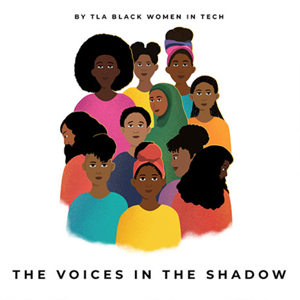
As I was growing up, I’d never really thought: “Oh my gosh, nobody who looks like me is doing this.” When I was a kid, I always wanted to be like James Bond, with a little bit of Indiana Jones thrown in. It didn’t really matter that they were male. I never really thought that they were male role models. I just thought they were role models.
Everybody always talks about role models, and there’s a part of me that thinks role models will help, but at the same time, I think people can put too much emphasis on that. There are people that have a strong mindset and if they really want to do something, it doesn’t matter who’s out here doing it or who’s not out there doing it, they will find a way. If they can’t find a way to do it, they will tell people they are trying to find a way to do it.
Some people are focused on their journey: “This happened to me, it took me a long time and then I finally overcome it,” which is really important, but there are also people who have never had that journey. They have never had to overcome something, but don’t discount those people. Sometimes there are people who haven’t had those struggles but this doesn’t mean that their life or their experiences are any less relevant.
Or sometimes they have had a journey but haven’t talked about it. They may have done extremely well for themselves, but they choose not to speak about their journey because that is not the focus and emphasis of what they want people to know. Not everybody wants to share everything, whereas the whole culture around social media today is about sharing everything.
Ticking the ‘right’ boxes?
When it comes to intersectionality, I’m a Black female with an eye disorder. and I’m a veteran, so I tick a lot of diversity and inclusion boxes, but I have a speaker agent, and whenever I do stuff, I tell him: “Don’t ever put me forth for something that is just based on my gender, or based on my race. Please don’t do that.” It needs to be because they’re looking for an expert in tech to deal with intelligence or something like that.
The other parts are just extras. They are definitely not what defines me, because if that were the case, I wouldn’t be where I am with the career I have today.
At Penn State’s main campus of State College, the surrounding population was about 90% white. It was rare to see any non-university-affiliated people in the area. They either were attending or working at Penn State University. The demographics were slightly different at the Erie Campus (Behrend) but still heavily white.
Once I returned to school it was a private Catholic University in Erie, Pennsylvania, which is on Lake Erie. I believe I was the first Black female graduate on my programme. I was the first student from my particular programme and college in the university to get a Distinguished Alumni Award.
I’m also very proud of becoming a Fellow of the Council of Competitive Intelligence Fellows. I was the 91st Fellow in the world, a professional of the intelligence community with currently 104 of my peers. That’s national security and law enforcement, which is global.
I’m sitting alongside the people that wrote those textbooks I use. They were the people I looked up to when I was in university and now, they are now my friends. My induction is because of the things I did in my career that are different. Today, people don’t realise how much is contained in open-source information. There’s so much so much people give away. I was one of the first in my field to use technology like social media for the gathering of information too.
20 years ago, when I started out as a junior intelligence analyst in my first job nobody was paying attention or listening to us. We all licked our wounds and went into different organisations. Every once in a while, we’d get together again and be like: “How come nobody’s paying attention to this?” Then, all of a sudden, it hit the news and — boom! It was like everybody was talking about these companies. We were right.
Championing Safety Tech
I’m very interested in online safety and what DCMS (the Department for Culture, Media and Sport) is doing with the Online Harms Bill and Safety Tech. It’s about making sure social media companies are held to account for what people do on their platforms.
We have to make sure the social media companies are doing everything they can to keep people safe, which I’m really passionate about. Whilst they are focused more on child harms, I think if you start from the very top and say all harms, and then make it even more stringent in relation to the impacts on children, this will help to hold companies more accountable when users break the rules.
When you do something online that is considered criminal behaviour why should this be any different to doing something that is illegal when you’re offline because this is supposed to be just an extension of yourself? We need to see a tightening up of those loopholes across the board.
Coming up next
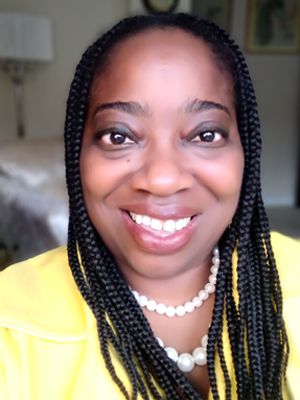
In a piece I wrote for Forbes online I discussed the disparities in the amounts of venture capital raised by men and women. When women come to me and asked me about helping with them pitch, I always advise them to ask for more than they think you should. This is because you should always add at least 30% to your bottom line.
This is the lowest number you should ever pitch for, ever, but really you should add 50%, or even 80%. This is your pie in the sky number, the one that some guy pitches for and gets because he goes in there all you know: “Hey, man, this is the best app in the world.”
You’d be really quite surprised when you go for that big number, how sometimes the number they give you is not very far from that. Guess what? Come down for that number a little bit, you’ll get it.

